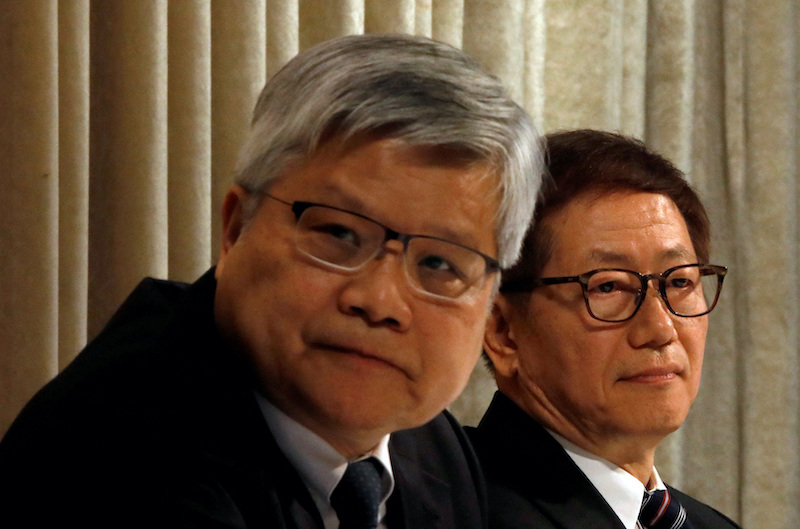The United States plans to levy a tariff of about 100% on imported computer chips – but that won’t apply to companies making or committed to making chips in the US.
The move is part of President Trump’s efforts to bring manufacturing back to the US, and his announcement on Wednesday came with news that Apple will invest an additional $100 billion in its home market.
For companies like Apple, which have committed to building factories in the United States, “there will be no charge,” Trump told reporters in the Oval Office. But he warned that companies should not try to wrangle out of pledges to build US factories.
ALSO SEE: India, Once Close to Deal With US, Now Faces 50% Tariffs
“If, for some reason, you say you’re building and you don’t build, then we go back and we add it up, it accumulates, and we charge you at a later date, you have to pay, and that’s a guarantee,” Trump added.
The comments were, however, not a formal tariff announcement, and much remains unclear about how companies and countries around the world will be impacted.
Trump’s mention of the proposed 100% rate for chips came in just ahead of US levies of 10% to 50% kicking in on Thursday for many goods from dozens of trading partners.
Rates on semiconductors and other key tech goods have been the subject of a US national security probe – the results of which are expected to be announced by mid-August.
Further tariffs on China ‘possible’
Trump on Wednesday said he could announce further tariffs on China similar to the 25% duties announced earlier on India over its purchases of Russian oil, depending on what happens.
“Could happen,” Trump told reporters, after saying he expected to announce more secondary sanctions aimed at pressuring Russia to end its war in Ukraine. He gave no further details.
“It may happen … I can’t tell you yet,” Trump said. “We did it with India. We’re doing it probably with a couple of others. One of them could be China.”
The additional 25% tariff on Indian goods, on top of a 25% tariff announced previously, was imposed because of its continued purchases of Russian oil.
The White House order did not mention China, which is another big purchaser of Russian oil. Last week, US Treasury Secretary Scott Bessent warned China that it could also face new tariffs if it continued buying Russian oil.
Reactions
Trump’s remarks on Wednesday produced a sudden flurry of reactions from concerned countries and business lobbies.
South Korea’s top trade envoy said on Thursday that major chipmakers Samsung Electronics and SK Hynix will not be subject to 100% tariffs, and South Korea will have the most favourable levies on semiconductors under a trade deal between Washington and Seoul.
Samsung and SK Hynix declined to comment.
On the other end of the spectrum, the president of the Philippine semiconductor industry, Dan Lachica, said Trump’s plan would be “devastating” for his country.
In Malaysia, which is a big player in chip testing and packaging globally, trade minister Tengku Zafrul Aziz warned parliament his country “will risk losing a major market in the United States if its products become less competitive as a result of the imposition of these tariffs.”
Nvidia also has big spending plans
Taiwan’s National Development Council Minister Liu Chin-ching told reporters on Thursday that Taiwanese companies have been building US plants or buying US firms with local factories as well as collaborating with US chipmakers to counter potential chip tariffs.
Taiwanese chip contract manufacturer TSMC is expected to be relatively unscathed as it has US factories, so key customers such as Nvidia are unlikely to face increased tariff costs for US-made chips.
Nvidia, which makes cutting-edge AI graphics processing units, also plans to invest hundreds of billions of dollars in the US. TSMC did not immediately reply to a request for comment, and an Nvidia spokesperson declined to comment.
“Large, cash-rich companies that can afford to build in America will be the ones to benefit the most. It’s survival of the biggest,” Brian Jacobsen, chief economist at investment advisory firm Annex Wealth Management, said.
Congress created a $52.7 billion semiconductor manufacturing and research subsidy program in 2022. The Commerce Department under President Joe Biden last year convinced all five leading-edge semiconductor firms to locate chip factories in the US as part of the programme.
The department said the US last year produced about 12% of semiconductor chips globally, down from 40% in 1990.
“There’s so much serious investment in the United States in chip production that much of the sector will be exempt,” Martin Chorzempa, senior fellow at the Peterson Institute for International Economics, said.
He added that chips made by China’s SMIC or Huawei are unlikely to be exempt, but noted that chips from these companies entering the US market were mostly incorporated into devices assembled in China.
“If these tariffs were applied without a component tariff, it might not make much difference,” he said.
The EU has said it agreed to a single 15% tariff rate for the vast majority of EU exports, including cars, chips and pharmaceuticals. Japan has said that the US agreed not to give it a worse tariff rate than other countries on chips.
Shares in Asian chipmakers with big US investment plans climbed on Thursday, with TSMC and Samsung up 4.4% and 2% respectively. Silicon wafer producer GlobalWafers, which has a plant in Texas, jumped 10%.
GlobalWafers said it has proactively implemented cost reduction strategies and believes it has an opportunity to maintain competitiveness.
- Reuters with additional editing by Jim Pollard
NOTE: Additional text was added to this report on August 7, 2025 (remarks about a possible additional tariff on China).
ALSO SEE:
Chip And Pharma Tariffs to be Announced Next Week: Trump
Three Detained in Taiwan For Alleged Theft of TSMC Chip Secrets
Cadence and Nvidia Dealings in China Drawing Close Scrutiny
Is the AI frenzy a hallucinatory bubble?
Nvidia CEO Says US Export Curbs on AI Chips is ‘Flawed’ Policy
China’s Xi Issues Rare Warning on Over-Investment in EVs, AI – FT
China Softens Tone on US Ties Amid Potential Thaw In Chip War
TSMC Sees 60% Profit Jump on AI Chip Demand, But Fears Tariffs
China Scrambles for Nvidia’s H20 Chips as Trump ‘Reverses’ Curbs
Nvidia’s Huang Says China’s Military ‘Can’t Rely on US Tech’
US Lawmakers Push Location-Tracking For High Powered AI Chips























